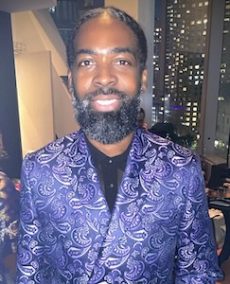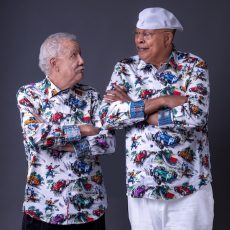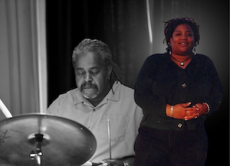
AXEL TOSCA
Three time Grammy-nominated Axel Tosca is a highly talented Cuban jazz pianist and composer who has gained recognition for his virtuosic performances and innovative compositions that blend elements of jazz, classical music, Hip-Hop and Afro-Cuban rhythms. Born in Cuba in 1983, Tosca grew up in a prestigious musical family. His mother is the renowned Cuban Trova singer Xiomara Laugart and his father is Cuban folk singer-guitarist Alberto Tosca. Introduced to guitar at age four, Tosca was also playing piano by age seven and soon joined his parents on stage playing his first show at Casa de las Americas.
Along with performing with his parents, he attended music school. One of his beloved teachers was Miriam Valdez, the daughter of Cuban piano legend Bebo Valdez and sister of Chucho Valdez. This first-class education enabled him to gain a wide range of experiences. Tosca has since become a sought-after performer, collaborator, and session musician, working with a diverse range of musicians and groups including jazz greats like Roy Hargrove and Steve Turre, Dennis & Swing, the Afro-Cuban All-Stars, Bobby Carcases, Teresa Garcia Caturla, Jose Miguel Crego, and more. Along with classical music, jazz, and Latin traditions, he also discovered hip-hop and played with The Roots when they toured Cuba. There is no limit for this visionary pianist, composer, producer, arranger and musical director.
More Posts: adventure,arranger,bandleader,club,composer,genius,history,instrumental,music,piano,preserving,travel,vocal

Daily Dose Of Jazz…
Fred Norman was born on October 5, 1910 in Leesburg, Florida. After attending Howard University, in Washington, DC he joined the Claude Hopkins band in 1932. Touring with the group as both a trombonist and singer for much of the 1930s, he notably recorded his own composition, Church Street Sobbin’ Blues, as the trombone soloist with the band in 1937 for Decca Records. He also appeared in short films with the Hopkins band during the 1930s.
Moving away from performance in 1938 he went on to work as a full-time music arranger. The late Thirties and 1940s saw him writing arrangements for Bunny Berigan, Tommy Dorsey, Benny Goodman, Lionel Hampton, Gene Krupa, Teddy Powell, Artie Shaw, Charlie Spivak, and Jack Teagarden.
In the 1950s he was the music director and arranger for multiple records made by the singers Sarah Vaughan and Dinah Washington. He continued to work as an arranger until his retirement in the 1970s.
Composer, arranger, trombonist, and vocalist Fred Norman died on February 19, 1993 in New York City.
More Posts: arranger,bandleader,composer,history,instrumental,jazz,music,trombone,vocal

Daily Dose Of Jazz…
Gerald Graham Valentine was born on September 13, 1914 and received formal training in music when he was young, learning piano, composition, and music theory. He learned to play the trombone on his own.
In the early 1940s Jerry composed and arranged for Earl Hines and worked in Chicago with Dallas Bartley, King Kolax and he booked shows for the Club DeLisa. He then joined Billy Eckstine’s band from 1944 to 1947 and worked later in the decade with Wynonie Harris and Buddy DeFranco.
From 1950 to 1952 Valentine was an artist and repertory man for National Records. He played with Gene Ammons in 1954, and in 1958-1959 wrote arrangements for Pepper Adams, Art Farmer, and Coleman Hawkins in the group Prestige Blues Swingers.
Trombonist, composer and arranger Jerry Valentine died in October 1983.
More Posts: arranger,composer,history,instrumental,jazz,music,trombone

PAQUITO D’RIVERA & CHUCHO VALDÉS
D’Rivera and Valdés: Together Again!
These rare benefit concerts features Cuban jazz legends, clarinetist, saxophonist, author, composer and arranger Paquito D’Rivera and pianist, composer, and arranger Chucho Valdés first met in 1962. Both child prodigies and sons of musical families, the two worked together in Havana’s Musical Theatre Orchestra and in the Cuban Orchestra of Modern Music.
More Posts: adventure,arranger,bandleader,clarinet,composer,genius,history,instrumental,jazz,music,piano,preserving,saxophone,travel

ERIC KENNEDY
Eric Kennedy & Friends: Tribute to Lisa
A Baltimore, Maryland native, Eric Kennedy is a drummer, vocalist, percussionist, educator, arranger and composer. He started performing at the age of three with a family band and encouraged by visiting local and national musicians.
Eric was the 2004 runner-up in the Billie Holiday Vocal Competition and first-place band member in the Chick Webb Jazz Combo Competitions 2008 and 2009. Eric also won the Jazz Journalists Association of America 2023 award for Baltimore Jazz Hero.
Eric has performed, toured, and recorded with Curtis Fuller, Jimmy Heath, Gary Bartz, Phil Woods, Billy Harper, Curtis Lundy, Bobby Watson, Gary Thomas, Fred Wesley, Wallace Roney, Cyrus Chestnut, Ethel Ennis, Larry Willis, Cecil McBee, Donald Harrison, Joe Locke, TK Blue, John Hicks, Richard Wyands, Yusef Salim, Eddie Henderson, Joe Bonner, Carl Grubbs, David Murray, Oliver Lake, Pansori master Ahn Sook Sun and many others.
The Band:
Eric Kennedy ~ drums
Marc Cary ~ piano
John Lee ~ guitar
Kelly Shepherd ~ alto saxophone
More Posts: adventure,arranger,bandleader,club,composer,drums,educator,genius,history,instrumental,jazz,music,percussion,preserving,travel,vocal



